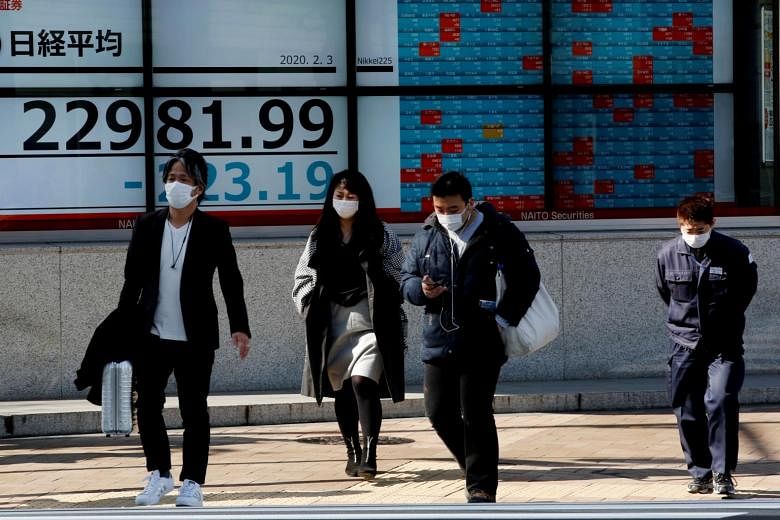SINGAPORE (REUTERS) - Asian share market rally paused on Thursday (Feb 13), bonds rose and trade-exposed currencies fell as a sharp rise in new coronavirus deaths and infections dented hopes that its spread was slowing.
China's Hubei province, where the virus is believed to have originated, reported 242 new deaths, double the previous day's toll, and confirmed 14,840 new cases on Feb. 12.
The rise in the number of Hubei cases, which came as officials adopted a new methodology for counting infections, is a ninefold increase from a day earlier.
MSCI's broadest index of Asia-Pacific shares outside Japan snapped two days of 1 per cent gains to sit 0.2 per cent lower as most markets across the region posted modest declines.
Japan's Nikkei fell 0.1 per cent. Australia's ASX/S&P 200 index retreated from a record high. The Shanghai Composite fell 0.5 per cent and Hong Kong's Hang Seng was 0.3 per cent softer.
Singapore's Straits Times Index was trading down 6.22 points or 0.2 per cent to 3,216.24 as of 2:55pm.
E-mini S&P 500 futures were down 0.4 per cent by the afternoon, pointing to a fade in Wall Street's strong rally, while Futures for the EUROSTOXX 50 were 0.1 weaker.
"There is no panic on this," said Frank Benzimra, head of Asia equity strategy at Societe Generale in Hong Kong, since the dramatic rise seems so far to be contained to Hubei.
The new methodology effectively lowers the bar for classifying new infections, contributing to the spike in cases. It relies on computerised tomography scans to find signs of the virus, rather than waiting for slower ribonucleic acid tests for confirmation. Chinese officials said the method is only being used in Hubei.
Despite that context, the dent to sentiment was enough to present a selling opportunity after several days of gains.
The virus has also cast a shadow over life in Asia's financial markets, with Benzimra himself logged in from home and speaking to clients by phone as meetings are increasingly cancelled, even in cities not subject to quarantine.
"Most markets were recouping their losses so that has offered maybe some excuse to sell Asian markets," he said. "But there is not much energy in this."
Ten-year US Treasuries fell below 1.6 per cent, the yen strengthened past 110 per dollar and a rally in oil prices halted.
MORE FORECASTS CUT
On Tuesday, markets had taken comfort from the World Health Organisation's (WHO) emergency programme head describing the apparent slowdown in the epidemic's spread as "very reassuring."
Yet WHO chief Tedros Adhanom Ghebreyesus had also warned that it should be viewed with extreme caution. "This outbreak could still go in any direction," he said.
More than 1,300 people have died from the epidemic in China and the total number of cases in Hubei province now stands at 48,206.
Even before the rise in cases, economists were turning more bearish on the likely hit to China's growth as factories idle and supply chains are upended.
Citi on Wednesday again downgraded its 2020 GDP forecast for China to 5.3 per cent. The bank had forecast it to be 5.8 per cent in its January outlook, before cutting it to 5.5 per cent two weeks ago.
Morgan Stanley believes a gradual, rather than sharp recovery is the most likely scenario. That all bodes ill for regional economies and has weighed on Asian currencies and commodities.
The Australian dollar, a liquid proxy for China's economic health because of Australia's export exposure, retraced its recent rally and traded 0.3 per cent softer at US$0.6716.
China's yuan was 0.1 per cent weaker.
Rallying oil prices paused, with Brent crude flat atUS$55.72 per barrel, 15 per cent below where it was before the coronavirus outbreak.











